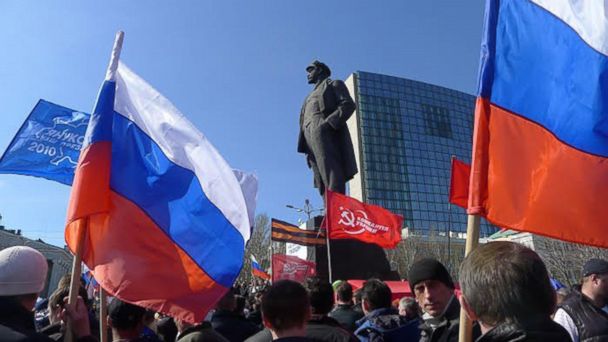Russia Already Selling Crimea Annexation in School Lessons

(Photo Credit: Roy Gutman/MCT via Getty Images)
MOSCOW - "History is written by the victors," the old saying goes. And Russia, fresh off its annexation of Crimea, is wasting no time trumpeting its version of events.
State-run media, which holds a near monopoly in Russia, relentlessly waves the flag about Russia's reunification with Crimea, which had been gifted to Ukraine 60 years ago. Russian news programs report on waves of refugees fleeing to Crimea to escape fascism in Kiev, a claim Western reporters and governments say is unfounded.
Now, the push is on to spread this message to the classroom.
RELATED: Russia Even Hijacks Ukraine's Navy Dolphins
Moscow's Department of Education and Methodological Center, the body that sets the public school curriculum, has issued guidelines for Russian teachers to lead a class entitled "We are United" about Crimea's joining the Russian Federation.
A lawmaker from the ruling United Russia party explained the lessons as necessary to clarify for students what actually happened.
"They have to explain the position that the president took," Nikolai Bulaev told Russia's Interfax news agency, referring to Russian President Vladimir Putin.
Russia's Deputy Minister of Education Benjamin Kaganov suggested that teachers and parents might even have conversations about the topic with students after school. "The referendum was held in full compliance with democratic procedures and rules of international law," the Education and Methodological Center's website reminds teachers.
RELATED: Obama Says Russia Is 'Regional Power,' Not America's Top Geopolitical Foe
Calling Crimea's annexation "a momentous event, which opens a new page of history," the center offers several prepared materials for the class. Among them are a history review for teachers, including a description of recent events in Ukraine and Crimea, a PowerPoint presentation for middle schoolers and a quiz for high school students, including a crossword puzzle.
Unsurprisingly, the lessons hew closely to the Kremlin's telling of events.
The suggested class material describes Crimea's decision to seek a referendum on independence amid "the increasing political instability and a criminalization of the situation" in Ukraine. The lesson makes no reference to Russia's disguised military presence and intimidation of opposition voices leading up to the snap vote.
The high school quiz reinforces the narrative of Crimea's longstanding ties to Russia dating back to the region's capture by Catherine the Great in 1783. The lesson includes an ode by a Russian poet, describing the taking of Crimea by Russian imperial forces that ends with the lines "Arise Crimea. You have awoken from your dreams and now your days will be bright."
It studies Leo Tolstoy's writings from his time defending the Crimean city of Sevastopol, then and now home to Russia's Black Sea Fleet, and asks students to analyze the city's strategic importance, including its strong and weak defense points.
RELATED: Pentagon 'Monitoring' Russian Troop Presence Along Ukraine Border
Perhaps most importantly, it asks students to base their answers on what they've learned in the class.
Key to the Kremlin's defense of annexing Crimea has been that the region's population long desired to be part of Russia and that Soviet leader Nikita Khrushchev's giving it to Ukraine was an historical blunder.
In that vein, the high school quiz asks pointed questions about whether the opinion of Crimea's population was taken into account back then, or in a subsequent referendum after the fall of the Soviet Union.
Kaganov, the deputy education minister, told Interfax that such lessons were important for the child becoming "aware of themselves as a citizen."